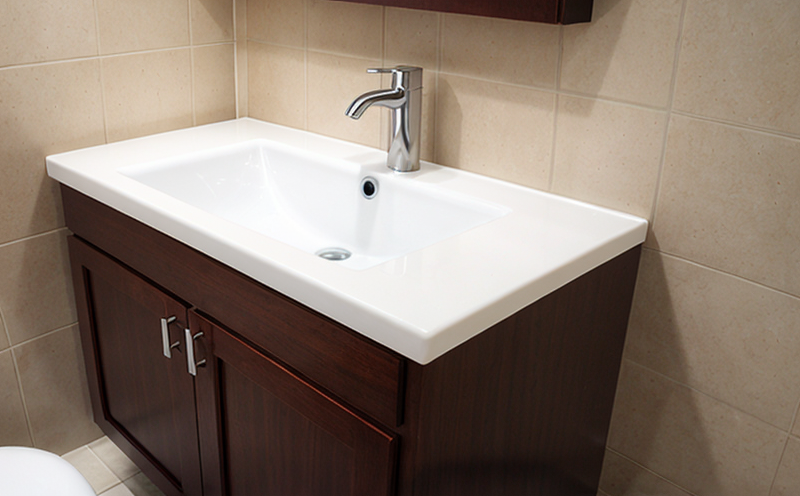DIN EN ISO 11357 DSC Thermal Analysis of Sanitary Plastics
The DIN EN ISO 11357 standard specifies the method for determining the thermal properties of materials using Differential Scanning Calorimetry (DSC). This service is particularly important in the bathroom and sanitary plastics sector, where understanding the behavior of polymers under various temperature conditions can lead to enhanced product performance. DSC provides precise measurements of heat flow between a sample and an inert reference material as a function of temperature or time.
For sanitary plastics such as polypropylene (PP), polyethylene (PE) and acrylonitrile butadiene styrene (ABS), this method is crucial for ensuring that the materials meet stringent performance criteria. The test helps in identifying phase transitions, glass transition temperatures (Tg), melting points (Tm), and crystallization temperatures (Tc). These values are critical for applications involving temperature cycling or exposure to varying environmental conditions.
The procedure involves heating a sample at a controlled rate while simultaneously monitoring the heat flow. The difference between the heat flows of the sample and reference is measured, which provides insights into thermal behavior. This service ensures that products meet the required specifications under DIN EN ISO 11357 standards, ensuring high quality and reliability.
During specimen preparation, it's essential to select appropriate cut pieces or pellets that accurately represent the properties of the material being tested. The test setup includes a sample pan containing the prepared specimens and a reference pan with an inert substance like alumina (Al2O3). The pans are placed in the DSC instrument, which heats them at a specified rate.
Understanding the glass transition temperature is vital as it determines the operational limits of materials. For instance, if a sanitary plastic component is exposed to temperatures above its Tg, it may become less rigid and more prone to deformation. Similarly, knowing the melting point helps in designing products that can withstand high-temperature applications without compromising performance.
The results from DIN EN ISO 11357 DSC testing are essential for quality managers and compliance officers as they provide a clear picture of how materials behave under different thermal conditions. This information is crucial for R&D engineers who need to optimize material properties for specific uses. Procurement teams can also rely on these test results when selecting suppliers, ensuring that the raw materials used meet the stringent requirements set by DIN EN ISO 11357.
By adhering to this standard, manufacturers ensure their products are reliable and safe across various environments. The accuracy of DSC testing allows for precise control over material properties, leading to better product design and improved customer satisfaction.
Why It Matters
The importance of DIN EN ISO 11357 DSC thermal analysis cannot be overstated, especially within the bathroom and sanitary plastics sector. Accurate measurement of thermal properties is crucial for ensuring that materials perform reliably under various temperature conditions.
For example, in the design of shower doors or bathtubs, understanding the melting point ensures that these components can withstand high temperatures without degrading. Similarly, for plumbing fixtures, knowing the glass transition temperature helps in selecting materials that remain rigid and functional even at lower temperatures.
The reliability of test results is paramount for quality assurance departments. By adhering to DIN EN ISO 11357 standards, manufacturers can ensure that their products meet regulatory requirements and industry expectations. This not only enhances customer trust but also contributes to brand reputation.
In addition to compliance, DSC testing offers valuable insights into material performance. Engineers can use these data points to refine product designs, improve durability, and enhance overall user satisfaction. The precision of the test results allows for better control over material properties, leading to more efficient production processes.
The importance of this service extends beyond just manufacturing; it also impacts end-users who benefit from products that are safe, durable, and reliable. By leveraging DIN EN ISO 11357 DSC thermal analysis, the industry can continue to innovate and meet evolving market demands.
Applied Standards
| Standard | Description |
|---|---|
| DIN EN ISO 11357-1 | Method of determining the thermal properties by differential scanning calorimetry (DSC) |
| DIN EN ISO 11357-2 | Calculation and presentation of results |
| Standard | Description |
|---|---|
| DIN EN ISO 9236 | Thermal shock testing for plastics |
| DIN EN ISO 178 | Tensile testing of plastic materials |
Quality and Reliability Assurance
The use of DIN EN ISO 11357 DSC thermal analysis is integral to maintaining high standards in the bathroom and sanitary plastics sector. This service ensures that products are not only compliant with international regulations but also meet the highest quality standards.
By adhering to this standard, manufacturers can ensure consistent product performance across all production batches. The precision of DSC testing allows for better control over material properties, leading to more efficient and effective manufacturing processes.
The reliability of test results is crucial for maintaining customer trust and satisfaction. Products that meet the stringent requirements set by DIN EN ISO 11357 are less likely to fail under stress or environmental conditions, enhancing overall product longevity.
Quality managers and compliance officers rely on these test results to ensure regulatory adherence and industry best practices. By leveraging this service, manufacturers can build a strong reputation for delivering high-quality products that meet the needs of both end-users and regulatory bodies.





